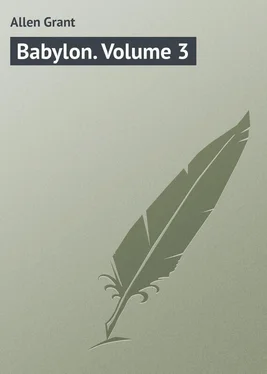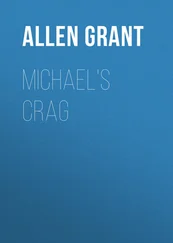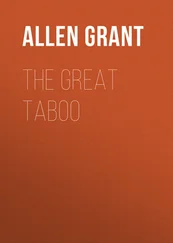Grant Allen - Babylon. Volume 3
Здесь есть возможность читать онлайн «Grant Allen - Babylon. Volume 3» — ознакомительный отрывок электронной книги совершенно бесплатно, а после прочтения отрывка купить полную версию. В некоторых случаях можно слушать аудио, скачать через торрент в формате fb2 и присутствует краткое содержание. ISBN: , Жанр: foreign_prose, на английском языке. Описание произведения, (предисловие) а так же отзывы посетителей доступны на портале библиотеки ЛибКат.
- Название:Babylon. Volume 3
- Автор:
- Жанр:
- Год:неизвестен
- ISBN:http://www.gutenberg.org/ebooks/47433
- Рейтинг книги:3 / 5. Голосов: 1
-
Избранное:Добавить в избранное
- Отзывы:
-
Ваша оценка:
- 60
- 1
- 2
- 3
- 4
- 5
Babylon. Volume 3: краткое содержание, описание и аннотация
Предлагаем к чтению аннотацию, описание, краткое содержание или предисловие (зависит от того, что написал сам автор книги «Babylon. Volume 3»). Если вы не нашли необходимую информацию о книге — напишите в комментариях, мы постараемся отыскать её.
Babylon. Volume 3 — читать онлайн ознакомительный отрывок
Ниже представлен текст книги, разбитый по страницам. Система сохранения места последней прочитанной страницы, позволяет с удобством читать онлайн бесплатно книгу «Babylon. Volume 3», без необходимости каждый раз заново искать на чём Вы остановились. Поставьте закладку, и сможете в любой момент перейти на страницу, на которой закончили чтение.
Интервал:
Закладка:
Grant Allen
Babylon, Volume 3
CHAPTER XXIX. A VIEW OF ROME, By Hiram Winthrop
In the midst of an undulating sunlit plain, fresh with flowers in spring, burnt and yellow in summer and autumn, a great sordid shrivelled city blinks and festers visibly among the rags and tatters in the eye of day. Within its huge imperial walls the shrunken modern town has left a broad skirt of unoccupied hillocks; low mounds covered by stunted straggling vineyards, or broken here and there by shabby unpicturesque monasteries, with long straight pollard-lined roads stretching interminably in dreary lines between the distant boundaries. In the very centre, along some low flats that bound a dull, muddy, silent river, the actual inhabited city itself crouches humbly beneath the mouldering ruins of a nobler age. A shapeless mass of dingy, weather-stained, discoloured, tile-roofed buildings, with all its stucco peeling in the sun, it lies crowded and jammed into a narrow labyrinth of tortuous alleys, reeking with dirt, and rich in ragged filthy beggars. One huge lazaretto of sin and pestilence, choked with the accumulated rubbish and kitchen-middens of forty centuries – that was Hiram Winthrop’s Rome – the Rome which fate and duty compelled him to exchange for the wild woods and the free life of untrammelled nature.
Step into one of the tortuous alleys, and you see this abomination of desolation even more distinctly, under the pitiless all-exposing glare of an Italian sky. The blotchy walls rise so high into the air to right and left, that they make the narrow lane gloomy even at midday; and yet, the light pours down obliquely upon the decaying plaster with so fierce a power that every rent and gap and dirt-stain stands out distinctly, crying in vain to the squalid tenants in the dens within to repair its unutterable dilapidation. Beneath, the little slippery pavement consists of herringbone courses of sharp stones; overhead, from ropes fastened across the street, lines of rags and tatters flutter idly in the wind, proving (what Hiram was otherwise inclined to doubt) that people at Rome do sometimes ostensibly wash their garments, or at least damp them. Dark gloomy shops line either side; shops windowless and doorless, entered and closed by shutters, and just rendered visible by the feeble lamp that serves a double duty as lightener of the general darkness, and taper to the tiny painted shrine of the wooden Madonna. A world of hungry ragged men, hungry dirty slatternly women, hungry children playing in the gutter, hungry priests pervading the very atmosphere – that on a closer view was Rome as it appeared to Hiram Winthrop.
To be sure, there was a little more of it. Up towards the Corso and Piazza del Popolo, there was a gaunt, modern Haussmannised quarter, the Rome of the strangers – cleaner by a fraction, whiter by a great deal, less odorous by a trifle, but still to Hiram Winthrop utterly flat, stale, and unprofitable. The one Rome was ugly, if picturesque; the other Rome was modern, and not even ugly.
Work at Seguin’s studio was also to Hiram a wretched mockery of an artistic training. The more he saw of the French painter, the more he disliked him: and what was worse, the dislike was plainly mutual. For Audouin’s sake, because Audouin had wished it, Hiram went on working feebly at historical pictures which he hated and could never possibly care for; but he panted to be free from the wretched bondage at once and for ever. Two years after his arrival in Rome, where he was now living upon the little capital he had derived from the sale of the deacon’s farm, Hiram determined, on Audouin’s strenuous advice, by letter delivered, to send a tentative painting to Paris for the Salon. Seguin watched it once or twice in the course of its completion, but he only shrugged his lean shoulders ominously, and muttered incomprehensible military oaths to himself, which he had picked up half a century before from his father, the ex-corporal. (On the strength of that early connection with the army, Seguin, in spite of his shrivelled frame, still affected a certain swaggering military air and bearing upon many occasions.) When it was finished, he looked at it a trifle contemptuously, and then murmured: ‘Good. That will finish him. After that – ’ An ugly grimace did duty for the rest of the sentence.
Still, Hiram sent it in, as Audouin had desired of him; and in due time received the formal intimation from the constituted authorities of the Salon that his picture had been rejected. He knew it would be, and yet he felt the disappointment bitterly. Sitting alone in his room that evening (for he would not let even Colin share his sorrow) he brooded gloomily by himself, and began to reflect seriously that after all his whole life had been one long and wretched failure. There was no denying it, he had made a common but a fatal error; he had mistaken the desire to paint for the power of painting. He saw it all quite clearly now, and from that moment his whole career seemed in his eyes to be utterly dwarfed and spoiled and blighted.
There was only one part of each of those four years of misery at Rome that Hiram could ever afterwards look back upon with real pleasure. Once every summer, he and Colin started off together for a month’s relaxation in the Tyrol or Switzerland. On those trips, Hiram forgot all the rest of his life altogether, and lived for thirty clear days in a primitive paradise. His sketch-book went always with him, and he even ventured to try his hand upon a landscape or two in oils, now that he was well out of the way of Seguin’s chilly magisterial interference. Colin Churchill always praised them warmly: ‘But then Colin, you know’ (Hiram said to himself). ‘is always such a generous enthusiastic fellow. He has such a keen artistic eye himself, of course, that he positively reads beauty into the weakest efforts of any other beginner. Still, I do feel that I can put my soul into drawing these rocks and mountains, which I never can do in painting a dressed-up model in an artificial posture, and pretending that I think she’s really Cleopatra. If one had the genuine Cleopatra to paint, now, exactly as she threw herself naturally down upon her own Egyptian sofa, why that might possibly be quite another matter. But, even so, Cleopatra could never have moved me half so much as the gloss on the chestnuts and the shimmer of the cloud-light on the beautiful purple water down below there.’
Sometimes, too, Hiram took Colin with him out into the Campagna; not that he loved the Campagna – there was an odour of Rome about it; but still at least it was a sort of country, and to Hiram Winthrop that was everything. One day, in his fourth year in Italy, he was sitting on a spring afternoon with Colin beside the arches of a broken aqueduct in that great moorland, which he had been using as the foreground for a little water-colour. He had finished his sketch, and was holding it at different angles before him, when Colin suddenly broke the silence by saying warmly: ‘Some day, Winthrop, I’m sure you must sell them.’
Hiram shook his head despondently. ‘No, no, Churchill,’ he answered with a half-angry wave of his disengaged hand. ‘Even while I was at Seguin’s, I knew I could never do anything worth looking at, and since I took this little studio myself, I feel sure of it. It’s only your kindness that makes you think otherwise.’
Colin took the sketch from him for a moment and eyed it carefully. ‘My dear fellow,’ he said at last, ‘believe me, you’re mistaken. Just look at that! Why, Winthrop, I tell you candidly, I’m certain there’s genius in it.’
Hiram smiled bitterly. ‘No, no, not genius, I assure you,’ he answered with a sigh, ‘but only the longing for it. You have genius, I have nothing more than aspiration.’
Читать дальшеИнтервал:
Закладка:
Похожие книги на «Babylon. Volume 3»
Представляем Вашему вниманию похожие книги на «Babylon. Volume 3» списком для выбора. Мы отобрали схожую по названию и смыслу литературу в надежде предоставить читателям больше вариантов отыскать новые, интересные, ещё непрочитанные произведения.
Обсуждение, отзывы о книге «Babylon. Volume 3» и просто собственные мнения читателей. Оставьте ваши комментарии, напишите, что Вы думаете о произведении, его смысле или главных героях. Укажите что конкретно понравилось, а что нет, и почему Вы так считаете.












